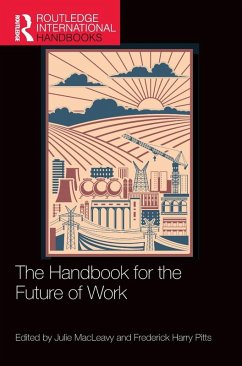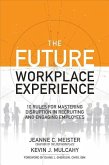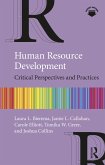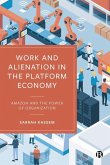The Handbook for the Future of Work
Herausgeber: Macleavy, Julie; Pitts, Frederick Harry
The Handbook for the Future of Work
Herausgeber: Macleavy, Julie; Pitts, Frederick Harry
- Gebundenes Buch
- Merkliste
- Auf die Merkliste
- Bewerten Bewerten
- Teilen
- Produkt teilen
- Produkterinnerung
- Produkterinnerung
The Handbook for the Future of Work offers a timely and critical analysis of the transformative forces shaping work and employment in the 21st century.
Andere Kunden interessierten sich auch für
![The Routledge Handbook of Political Ecology The Routledge Handbook of Political Ecology]() The Routledge Handbook of Political Ecology50,99 €
The Routledge Handbook of Political Ecology50,99 €![Capitalism and the Political Economy of Work Time Capitalism and the Political Economy of Work Time]() Christoph HermannCapitalism and the Political Economy of Work Time59,99 €
Christoph HermannCapitalism and the Political Economy of Work Time59,99 €![The Sociology of Contemporary Work The Sociology of Contemporary Work]() Marek Korczynski (University of Nottingham)The Sociology of Contemporary Work42,99 €
Marek Korczynski (University of Nottingham)The Sociology of Contemporary Work42,99 €![The Future Workplace Experience The Future Workplace Experience]() Jeanne MeisterThe Future Workplace Experience24,99 €
Jeanne MeisterThe Future Workplace Experience24,99 €![The Routledge Handbook on Ecosocialism The Routledge Handbook on Ecosocialism]() The Routledge Handbook on Ecosocialism47,99 €
The Routledge Handbook on Ecosocialism47,99 €![Human Resource Development Human Resource Development]() Laura L. Bierema (USA University of Georgia)Human Resource Development57,99 €
Laura L. Bierema (USA University of Georgia)Human Resource Development57,99 €![Work and Alienation in the Platform Economy Work and Alienation in the Platform Economy]() Sarrah Kassem (University of Tubingen)Work and Alienation in the Platform Economy51,99 €
Sarrah Kassem (University of Tubingen)Work and Alienation in the Platform Economy51,99 €-
-
-
The Handbook for the Future of Work offers a timely and critical analysis of the transformative forces shaping work and employment in the 21st century.
Hinweis: Dieser Artikel kann nur an eine deutsche Lieferadresse ausgeliefert werden.
Hinweis: Dieser Artikel kann nur an eine deutsche Lieferadresse ausgeliefert werden.
Produktdetails
- Produktdetails
- Routledge International Handbooks
- Verlag: Taylor & Francis Ltd
- Seitenzahl: 424
- Erscheinungstermin: 26. Dezember 2024
- Englisch
- Abmessung: 253mm x 182mm x 32mm
- Gewicht: 900g
- ISBN-13: 9781032355924
- ISBN-10: 1032355921
- Artikelnr.: 71264797
- Herstellerkennzeichnung
- Libri GmbH
- Europaallee 1
- 36244 Bad Hersfeld
- gpsr@libri.de
- Routledge International Handbooks
- Verlag: Taylor & Francis Ltd
- Seitenzahl: 424
- Erscheinungstermin: 26. Dezember 2024
- Englisch
- Abmessung: 253mm x 182mm x 32mm
- Gewicht: 900g
- ISBN-13: 9781032355924
- ISBN-10: 1032355921
- Artikelnr.: 71264797
- Herstellerkennzeichnung
- Libri GmbH
- Europaallee 1
- 36244 Bad Hersfeld
- gpsr@libri.de
Julie MacLeavy is a Professor of Economic Geography at the University of Bristol, UK specialising in feminist political economy, economic transformations and new forms of work. She is the Theme Lead for the 'Innovation, Transition, Change' challenge within the new Academic Research Hub for the Prevention of Gambling Harms at the University of Bristol, co-Editor-in-Chief of Geoforum and Treasurer of the Royal Geographical Society (with the Institute of British Geographers) Economic Geography Research Group. Julie is the co-editor of The Handbook of Neoliberalism (Routledge) and author of Enduring Austerity: The Uneven Geographies of the Post-Welfare State (University of Bristol Press), which examines how austerity policies create an uneven landscape of work and welfare opportunities across different communities. Frederick Harry Pitts is a Senior Lecturer in Politics at the University of Exeter's Cornwall Campus in his hometown of Penryn, where he is also the Director of Business Engagement and Innovation for Humanities and Social Sciences. He is a Co-Investigator of the Economic and Social Research Council Centre for Sociodigital Futures, a Fellow of the Institute for the Future of Work, Secretary of the British Universities Industrial Relations Association and an Honorary Senior Research Fellow at University of Bristol Business School. He is the author or coauthor of five previous books, most recently Marx in Management and Organisation Studies: Rethinking Value, Labour and Class Struggles (Routledge).
Part I: Introduction 1. An Introduction to The Handbook for the Future of
Work Part 2: Futures of Work in Context 2. The future of work: A history 3.
What is the fourth industrial revolution? Towards a critical theory of the
future of work 4. Financialisation of work futures Part 3: Automation,
Technology and the Future of Work 5. The political economy of labour and
technological disruptions in capitalism 6. Automation and the future of
work 7. Resisting determinism(s): Unpacking cognitive technology and
automation Part 4: Platforms, Platform Labour and Gig Work 8. Platform
labour and gig work futures: Uncovering women's hidden digital labour 9.
Non-labour platforms and their effects on work in specific sectors: a major
gap in recent research on work and employment 10. Fighting the algorithm:
The rise of activism in the face of platform inequality Part 5: Identity
and Difference in the Future of Work 11. A future of racial capitalism:
Reproducing coercion through new digital labour in South Africa 12.
Disability and the Future of Work 13. Work, wealth and the future: Evolving
class structures and social mobility in a changing world of work Part 6:
Gender, Care and Social Reproduction 14. Gender and The Future of Work in
the Affective and Agile Economies 15. Queering the Future of Work: Queer
and trans temporalities for (re)thinking work and social reproduction 16.
Care and the Future of Work Part 7: Sectoral Case Studies 17. Services are
the future of work 18. Industry 5.0 and the future of work in manufacturing
in Australia 19. A means to an end? The role of technology in growth and
post-growth futures of agrifood work in a European context Part 8: Labour
Market Transitions and Insecurity 20. Young Workers: Understanding labour
market transitions and improving job quality 21. Considering the futures of
unpaid work 22. Navigating self-employment in the evolving landscape of
work: reflecting on the past and anticipating the future Part 9: Mobilities
and Geographies of Work Futures 23. Global production and the future of
work: Past, present and futures of just-in-time 24. Reshaping the geography
of work: Remote worker migration and regional dynamics in the post-pandemic
era 25. Resisting precarity in city-regions Part 10: Policy and the
Politics of Work Futures 26. Industrial relations and the futures of work:
efficiency, equity and voice in the 21st century 27. Welfare policy: the
role of social protection and active labour market programmes in the future
of work 28. Politics and the future of work: Routine work, automation risk
and redistributive preferences in the age of populism Part 11: Environment
and the Future of Work 29. Green jobs, just transition and the future of
work 30. Energy transitions and the future of decent work in Asian garment
factories 31. Thermal Futures of Work: Intertwined economic and
environmental trajectories under climate change Part 12: Conclusion 32.
Conclusions and future challenges: The end of work and the end of history
Work Part 2: Futures of Work in Context 2. The future of work: A history 3.
What is the fourth industrial revolution? Towards a critical theory of the
future of work 4. Financialisation of work futures Part 3: Automation,
Technology and the Future of Work 5. The political economy of labour and
technological disruptions in capitalism 6. Automation and the future of
work 7. Resisting determinism(s): Unpacking cognitive technology and
automation Part 4: Platforms, Platform Labour and Gig Work 8. Platform
labour and gig work futures: Uncovering women's hidden digital labour 9.
Non-labour platforms and their effects on work in specific sectors: a major
gap in recent research on work and employment 10. Fighting the algorithm:
The rise of activism in the face of platform inequality Part 5: Identity
and Difference in the Future of Work 11. A future of racial capitalism:
Reproducing coercion through new digital labour in South Africa 12.
Disability and the Future of Work 13. Work, wealth and the future: Evolving
class structures and social mobility in a changing world of work Part 6:
Gender, Care and Social Reproduction 14. Gender and The Future of Work in
the Affective and Agile Economies 15. Queering the Future of Work: Queer
and trans temporalities for (re)thinking work and social reproduction 16.
Care and the Future of Work Part 7: Sectoral Case Studies 17. Services are
the future of work 18. Industry 5.0 and the future of work in manufacturing
in Australia 19. A means to an end? The role of technology in growth and
post-growth futures of agrifood work in a European context Part 8: Labour
Market Transitions and Insecurity 20. Young Workers: Understanding labour
market transitions and improving job quality 21. Considering the futures of
unpaid work 22. Navigating self-employment in the evolving landscape of
work: reflecting on the past and anticipating the future Part 9: Mobilities
and Geographies of Work Futures 23. Global production and the future of
work: Past, present and futures of just-in-time 24. Reshaping the geography
of work: Remote worker migration and regional dynamics in the post-pandemic
era 25. Resisting precarity in city-regions Part 10: Policy and the
Politics of Work Futures 26. Industrial relations and the futures of work:
efficiency, equity and voice in the 21st century 27. Welfare policy: the
role of social protection and active labour market programmes in the future
of work 28. Politics and the future of work: Routine work, automation risk
and redistributive preferences in the age of populism Part 11: Environment
and the Future of Work 29. Green jobs, just transition and the future of
work 30. Energy transitions and the future of decent work in Asian garment
factories 31. Thermal Futures of Work: Intertwined economic and
environmental trajectories under climate change Part 12: Conclusion 32.
Conclusions and future challenges: The end of work and the end of history
Part I: Introduction 1. An Introduction to The Handbook for the Future of
Work Part 2: Futures of Work in Context 2. The future of work: A history 3.
What is the fourth industrial revolution? Towards a critical theory of the
future of work 4. Financialisation of work futures Part 3: Automation,
Technology and the Future of Work 5. The political economy of labour and
technological disruptions in capitalism 6. Automation and the future of
work 7. Resisting determinism(s): Unpacking cognitive technology and
automation Part 4: Platforms, Platform Labour and Gig Work 8. Platform
labour and gig work futures: Uncovering women's hidden digital labour 9.
Non-labour platforms and their effects on work in specific sectors: a major
gap in recent research on work and employment 10. Fighting the algorithm:
The rise of activism in the face of platform inequality Part 5: Identity
and Difference in the Future of Work 11. A future of racial capitalism:
Reproducing coercion through new digital labour in South Africa 12.
Disability and the Future of Work 13. Work, wealth and the future: Evolving
class structures and social mobility in a changing world of work Part 6:
Gender, Care and Social Reproduction 14. Gender and The Future of Work in
the Affective and Agile Economies 15. Queering the Future of Work: Queer
and trans temporalities for (re)thinking work and social reproduction 16.
Care and the Future of Work Part 7: Sectoral Case Studies 17. Services are
the future of work 18. Industry 5.0 and the future of work in manufacturing
in Australia 19. A means to an end? The role of technology in growth and
post-growth futures of agrifood work in a European context Part 8: Labour
Market Transitions and Insecurity 20. Young Workers: Understanding labour
market transitions and improving job quality 21. Considering the futures of
unpaid work 22. Navigating self-employment in the evolving landscape of
work: reflecting on the past and anticipating the future Part 9: Mobilities
and Geographies of Work Futures 23. Global production and the future of
work: Past, present and futures of just-in-time 24. Reshaping the geography
of work: Remote worker migration and regional dynamics in the post-pandemic
era 25. Resisting precarity in city-regions Part 10: Policy and the
Politics of Work Futures 26. Industrial relations and the futures of work:
efficiency, equity and voice in the 21st century 27. Welfare policy: the
role of social protection and active labour market programmes in the future
of work 28. Politics and the future of work: Routine work, automation risk
and redistributive preferences in the age of populism Part 11: Environment
and the Future of Work 29. Green jobs, just transition and the future of
work 30. Energy transitions and the future of decent work in Asian garment
factories 31. Thermal Futures of Work: Intertwined economic and
environmental trajectories under climate change Part 12: Conclusion 32.
Conclusions and future challenges: The end of work and the end of history
Work Part 2: Futures of Work in Context 2. The future of work: A history 3.
What is the fourth industrial revolution? Towards a critical theory of the
future of work 4. Financialisation of work futures Part 3: Automation,
Technology and the Future of Work 5. The political economy of labour and
technological disruptions in capitalism 6. Automation and the future of
work 7. Resisting determinism(s): Unpacking cognitive technology and
automation Part 4: Platforms, Platform Labour and Gig Work 8. Platform
labour and gig work futures: Uncovering women's hidden digital labour 9.
Non-labour platforms and their effects on work in specific sectors: a major
gap in recent research on work and employment 10. Fighting the algorithm:
The rise of activism in the face of platform inequality Part 5: Identity
and Difference in the Future of Work 11. A future of racial capitalism:
Reproducing coercion through new digital labour in South Africa 12.
Disability and the Future of Work 13. Work, wealth and the future: Evolving
class structures and social mobility in a changing world of work Part 6:
Gender, Care and Social Reproduction 14. Gender and The Future of Work in
the Affective and Agile Economies 15. Queering the Future of Work: Queer
and trans temporalities for (re)thinking work and social reproduction 16.
Care and the Future of Work Part 7: Sectoral Case Studies 17. Services are
the future of work 18. Industry 5.0 and the future of work in manufacturing
in Australia 19. A means to an end? The role of technology in growth and
post-growth futures of agrifood work in a European context Part 8: Labour
Market Transitions and Insecurity 20. Young Workers: Understanding labour
market transitions and improving job quality 21. Considering the futures of
unpaid work 22. Navigating self-employment in the evolving landscape of
work: reflecting on the past and anticipating the future Part 9: Mobilities
and Geographies of Work Futures 23. Global production and the future of
work: Past, present and futures of just-in-time 24. Reshaping the geography
of work: Remote worker migration and regional dynamics in the post-pandemic
era 25. Resisting precarity in city-regions Part 10: Policy and the
Politics of Work Futures 26. Industrial relations and the futures of work:
efficiency, equity and voice in the 21st century 27. Welfare policy: the
role of social protection and active labour market programmes in the future
of work 28. Politics and the future of work: Routine work, automation risk
and redistributive preferences in the age of populism Part 11: Environment
and the Future of Work 29. Green jobs, just transition and the future of
work 30. Energy transitions and the future of decent work in Asian garment
factories 31. Thermal Futures of Work: Intertwined economic and
environmental trajectories under climate change Part 12: Conclusion 32.
Conclusions and future challenges: The end of work and the end of history








